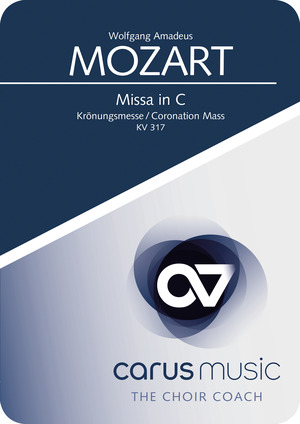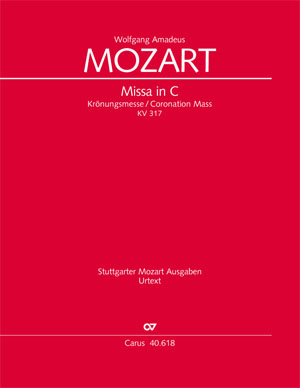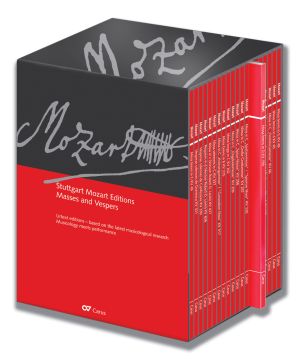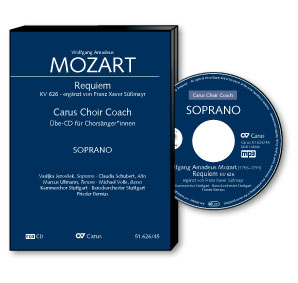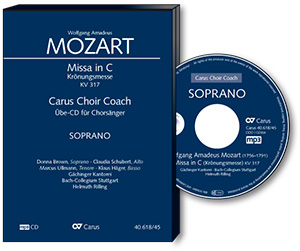
Mozart’s Mass in C major – known as the "Coronation Mass" for no obvious reason – is one of the most popular and most frequently-performed works of its kind. Although Mozart had to keep the setting short, in line with the Prince Bishop’s requirements, it is astonishingly varied. A great deal is required of the choir, both harmonically and through the somewhat unexpected dynamic twists and turns. A good rapport between chorus and choral director is necessary here – don’t have your nose in your copy!
The Carus Choir Coach offers choir singers the unique opportunity to study and learn their own, individual choral parts within the context of the sound of the entire choir and orchestra. For every vocal range a separate Audio CD or MP3 and download containing each choir part is available. The Carus Choir Coach is based on recorded interpretations by renowned artists who have performed the work from carefully prepared Carus Urtext editions. Each choir part is presented in three different versions:
- Original recording
- Coach: each part is accompanied by the piano, with the original recording sounding in the background
- Coach in slow mode: the tempo of the coach slows down to 70% of the original version – through this reduction passages can be learned more effectively.
Performers: Donna Brown (soprano), Claudia Schubert (alto), Marcus Ullmann (tenore), Klaus Häger (basso) – Gächinger Kantorei & Bach-Collegium Stuttgart – Helmuth Rilling
-
Composer
Wolfgang Amadeus Mozart
| 1756-1791As the son of the deputy Kapellmeister to the Salzburg Prince-Archbishop, Mozart was constantly surrounded by church music in his youth. On his travels Mozart became familiar with Italian church music, and later in Vienna he studied the works of Bach and Handel. After moving to Vienna he was faced with the new challenges of composing opera and piano concertos, and significantly the “C Minor Mass” KV 427, the greatest sacred work of the first Vienna years, remained unfinished. The last period of his life again shows a change of direction to church music: Mozart successfully applied to succeed the terminally ill Leopold Hoffmann as Kapellmeister at St Stephen's Cathedral, but he was unable to take up the position as he died before Hoffmann. A gem such as the “Ave verum” KV 618 and the incomplete Requiem KV 626 give us an idea of what Mozart might have achieved as a composer of sacred music if he had taken up this important position. Personal details
-
Ensemble
Gächinger Kantorei Stuttgart
Since August 2013, the Gächinger Kantorei Stuttgart has been under the artistic direction of Hans-Christoph Rademann, the director of the Internationale Bachakademie Stuttgart. Under the patronage of the Bachakademie, the choir plays a decisive role in a wide range of concerts, guest performances and recordings for both radio and CD. The center of the choir’s activities consists, in addition to its manifold activities in the MUSI KFEST UTT GART , of a large concert series with oratorio programs ranging from Schütz to commissioned contemporary works. The interpretation of vocal works by Johann Sebastian Bach has always been a special focus of the choir. The Gächinger Kantorei Stuttgart, which is named after a small village in the Swabian Alb and was founded by Helmuth Rilling in 1954, has ranked as one of the outstanding concert choirs of the world for decades. In addition to regular performances with its partner ensemble, the Bach-Collegium Stuttgart, the choir frequently works together with orchestras such as the Vienna Philharmonic, the New York Philharmonic and the Israel Philharmonic. It also has a particularly close relationship with the Stuttgart Radio Symphony Orchestra of the SWR. The choir is regularly conducted by guest conductors such as Masaaki Suzuki, Krzysztof Penderecki, Alexander Liebreich and Sir Roger Norrington. Guest performances have led the ensemble to, among others, China and Latin America, as well as to the large festivals Salzburg, Lucerne, Prague, New York, Paris, London, Vienna and Seoul. The choir has recorded hundreds of CDs which include Bach’s complete vocal works, diverse 18th century oratorios as well as several world premieres including works by Penderecki, Pärt and Rihm. Personal details
-
Ensemble
Bach-Collegium Stuttgart
-
Conductor
Helmuth Rilling
| 1933
-
Soloist - soprano
Donna Brown
-
Soloist - alto
Claudia Schubert
Claudia Schubert began studying singing in 1986 at the Hochschule für Musik und Darstellende Kunst in Frankfurt with Elsa Cavelti and participated in master classes with Laura Sarti in London. From 1987 to 1991 she held a scholarship from the Studienstiftung des Deutschen Volkes. Since 1987 she has appeared in many important music centers in Europe, in Israel, Japan, Canada and the USA. At renowned festivals for early music she has collaborated with conductors such as Frieder Bernius, Frans Brüggen, Sir John Eliot Gardiner, Reinhard Goebel, Ton Koopman, Herrmann Max, and Jordi Savall. Her activities have been augmented with guest appearances at the opera houses in Frankfurt, Brussels and Salzburg. Personal details
-
Soloist - tenor
Marcus Ullmann
-
Soloist - bass
Klaus Häger
Klaus Häger was born in Wuppertal. After completing his Abitur, he studied music education and later singing with Franz Müller-Heuser, Ingeborg Most and Jürgen Glauß (lied interpretation) in Cologne and Freiburg. He took part in master classes with Sena Jurinac, Ernst Haefliger and Dietrich Fischer-Dieskau. As a student, he gave lieder recitals and performed in orchestral concerts and numerous oratorios, both in Germany and abroad. Klaus Häger’s artistic activities include radio, television and CD recordings. He is a prizewinner of numerous international competitions, including the “Bundeswettbewerb Gesang” in 1990 in Berlin (1st prize in the category “concert” and two special prizes.) Klaus Häger has participated in several festivals, e.?g., the Salzburg Festival, the Schwetzingen Festival and the Schleswig-Holstein Music Festival, and has collaborated with renowned conductors. From 1991–1997, Klaus Häger was a member of the ensemble of the Hamburg State Opera, and from 1998–2003, he was a member of the ensemble of the Berlin State Opera. In 2002, he made his debut at the Bayreuth Festival in Die Meistersinger von Nürnberg under Christian Thielemann. In 2004, Klaus Häger was appointed professor at the Rostock University of Music and Drama. Personal details
Frequent questions about this work
 There are no questions and answers available so far or you were unable to find an answer to your specific question about this work? Then click here and send your specific questions to our Customer Services!
There are no questions and answers available so far or you were unable to find an answer to your specific question about this work? Then click here and send your specific questions to our Customer Services!


